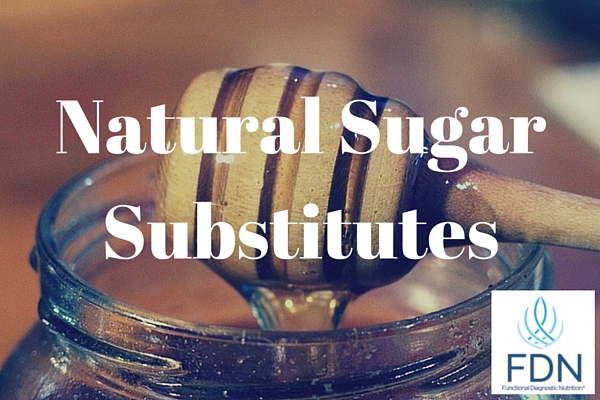As a functional health coach, when your clients make the switch to eating whole foods, one thing that they will need to change is their consumption of processed, refined sugar. Giving up sugar filled desserts and other forms of this refined sweetener can be a big struggle for many as they begin to make the transition to a healthier way of eating.
Fortunately, adopting a healthier way of life does not mean you have to walk away from dessert completely. In fact, there are plenty of great, natural sugar substitutes for processed white sugar and high fructose corn syrup that work just as well and taste just as great!
Americans currently consume and average of twenty teaspoons of sugar daily, which equals roughly 142 pounds of this unhealthy sweetener a year. And if you also consume a large amount of packaged and processed foods, you are eating substantially more as it is almost impossible to avoid refined sugar in these products.
Refined sugar is an anti-nutrient, which means that it actually leeches vital nutrients from the body. Because there is such a high level of consumption of sugar in the US, it is contributing to malnourishment in a growing number of people.
Many people make the mistake of switching from sugar and high fructose corn syrup to artificial sweeteners. But sugar free sweeteners such as Nutrisweet, Equal, and Sweet N’ Low should be avoided at all cost. These artificial sweeteners have been linked to a host of health problems such as migraines, cancer, Multiple Sclerosis, digestive problems and are known to be carcinogenic, even though they have been deemed “safe” for consumption. And a study was done that showed artificial sweeteners actually increased the appetite for sweet, sugary foods and caused weight gain in those who regularly consumed them (http://www.ncbi.nlm.nih.gov/pubmed/18298259). These artificial sweeteners are just that…artificial! They are chemical filled sweeteners that are unnatural and dangerous to consume regularly.
Because our bodies are naturally programmed to consume sweet foods, you can include a couple of these healthier sweeteners….in moderation. Just because it is natural does not mean that you can consume as much as you want!
Some alternative natural sweeteners
- Raw Honey. Honey is nature’s sweetener and is a good replacement for sugar. It is easy to use in a multitude of different recipes. Honey is a wonderful sweetener but also has anti-bacterial and anti-viral properties as well. It is best to source your honey locally when possible, and it is important to make sure your honey is raw as well. There has been concern that some of the less expensive store brands of honey are being mixed with high fructose corn syrup and sold to the public, so always look for pure raw honey or buy local from a beekeeper.
- Coconut sugar. This type of sugar comes from the sap of cut flower buds from the coconut palm tree and can be found in both liquid and granule form. It is low on the glycemic index, and so it does not raise blood sugar levels like refined sugar does. This type of sugar is safe for diabetics to use, and can be used in baking.
- Xylitol (birch sugar). This natural sweetener is made from either tree fiber or corn cobs. It is popular with diabetics because it low on the glycemic index. It is a sugar alcohol and so it can cause gas, bloating and diarrhea. This sweetener can also be toxic to dogs in small doses, so caution should be used if you have dogs in the home. If you choose to add xylitol to your sweetener list, make sure you purchase a brand that is certified organic. Most corn in the US and China (where a lot of xylitol originates) has been genetically modified to contain its own pesticides. Since they are now discovering the dangers of genetically modified corn, it’s best to pay a little extra for the organic product which by law must be free of genetically modified ingredients.
- Maple syrup. Maple syrup is made from boiled-down maple tree sap and contains vital minerals. It adds great flavor to food and works well for baking. It is important to buy 100% pure maple syrup and avoid maple-flavored corn syrup, which is what most of the pancake and waffle syrup on the grocery store shelves is made of. Grade B maple syrup is stronger in flavor and said to have more minerals than Grade A, although either can be used. This sweetener is not low on the glycemic index, so it is not a good choice for diabetics. Since it can elevate blood sugar levels, it is best to use this sweetener sparingly.
- Maple sugar. Maple sugar is created when the sap of the sugar maple is boiled for longer than is needed to create maple syrup. Once most of the water has evaporated, all that is left is the solid sugar. Maple sugar is about twice as sweet as standard granulated sugar, but it is much less refined. This is not a good substitute for diabetics because it is not a low glycemic sweetener. It is best to use this sweetener sparingly.
- Unsulphered blackstrap molasses. Organic molasses is probably the most nutritious sweetener derived from sugar cane or sugar beet. This distinct sweetener is made by a process of clarifying and blending the extracted juices. The longer the juice is boiled, the less sweet, more nutritious and darker the product is. Molasses imparts a very distinct flavor to food. Blackstrap molasses is the most nutritious variety, packed with vital nutrients such as iron, calcium, magnesium, potassium, b vitamins and manganese. It is also low on the glycemic index and so it can be a good choice for diabetics.
All of the sweeteners on this list are safe for those with Celiac and gluten intolerance!
It is important, and possible, to help guide your clients to choosing alternative, natural sweeteners. They can continue to enjoy the occasional treat as they move away from refined sugar for good.







